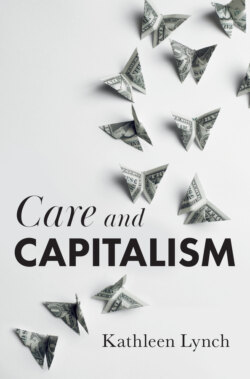Читать книгу Care and Capitalism - Kathleen Lynch - Страница 29
2 Care as Abject: Capitalism, Masculinity, Bureaucracy, Class and Race
ОглавлениеCapitalism does not survive solely on exploitative class relations. The production and reproduction of classes require care labour, both the care of people and of those parts of nature that are available for exploitation and commodity production (Dalla Costa and James 1972; Federici 2012; Patel and Moore 2018). Humans, non-human animals and the Earth itself require attentiveness to survive and flourish, and capitalism requires caring to happen, even it does not pay for it directly and exploits it indirectly.
While care is central to capitalism’s survival materially, the devaluation of care is also endemic to capitalism. There is a value disassociation within it through which the labour of caring and reproducing humanity itself is ‘dissociated from value and abstract labor’ (Scholz 2009: 127). The severance of production from reproduction and caring in modernity has created a deep dichotomy of values. ‘The commodity-producing civilizational model’ that is glorified under contemporary capitalism is underpinned by a system of care and domestic relations built around the marginalization of those who do the care work, mostly women, and the neglect of the natural and the social world (Scholz 2009: 130).1 Unpaid reproductive work, and unpaid love and care work, are not value-producing in capitalist terms. They have vital use values but not an exchange value.2 Affective care relations exist as a different order of values, values that are jettisoned within the ethics of capitalism.
The globalization of capitalism in the neoliberal financialized era has exacerbated this trend. The instrumental exploitative logic of homo economicus (Brown 2005) contradicts the logic of being homo curans; it undermines cooperative, nurturing, non-exploitative ways of relating to other humans and the natural world (Tronto 2017). In economic terms, care is defined as a private value for which capital is not responsible. And capitalism especially devalues relational embodied care, by treating it as both a cultural and an economic externality (Müller 2019). To pay for care directly would reduce profit (hence the persistent resistance to paying for public childcare in most countries, and, increasingly, resistance to paying for eldercare). In cultural terms, caring is associated with dependency, the vulnerable other who threatens productivity (profit) by either needing care or being tied to caring. Those in need of embodied care are treated as abject, as is the hands-on work of bodily caring, especially in societies that see both death and bodily fragility as problems to be eradicated (Banerjee and Rewegan, 2017).
At a wider cultural level, capitalism produces moral dispositions of indifference to the interests of others, what Adorno (2005) termed ‘bourgeois coldness’ in the pursuit of one’s own interests. This coldness is not the preserve of any one class or group, though the power to exercise coldness is most available to those with the capacities to exclude, and with most to gain from exercising indifference towards the vulnerable other. In the twenty-first century, the upper classes, especially the oligarchic elite, reflect these capitalist values as they live without allegiance to any nation state or people. In many respects, ‘their fate and that of their families have become independent from the fates of the societies from which they extract their wealth’ (Streeck 2016: 28). They can ‘buy’ political majorities through advertising and campaign contributions at election times, while gaining social legitimacy through philanthropy. They provide charity for their chosen ‘causes’, frequently funding public institutions, such as higher education and hospitals, impoverished by the elite’s failure to pay taxation commensurate with their personal and corporate wealth (Winters 2011; Browne 2013). And although a small number of women are among the oligarchic elite and the upper-middle-class professionals who service them, and thereby benefit from their class dividend, they are rarely the leaders or those who exercise controlling power over capital.
